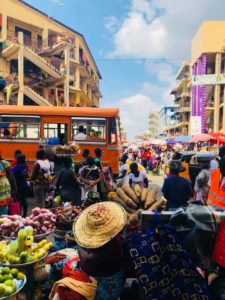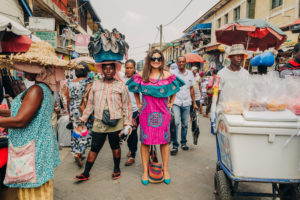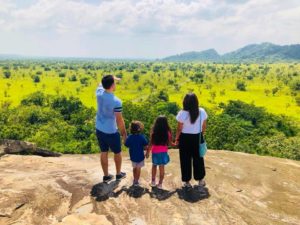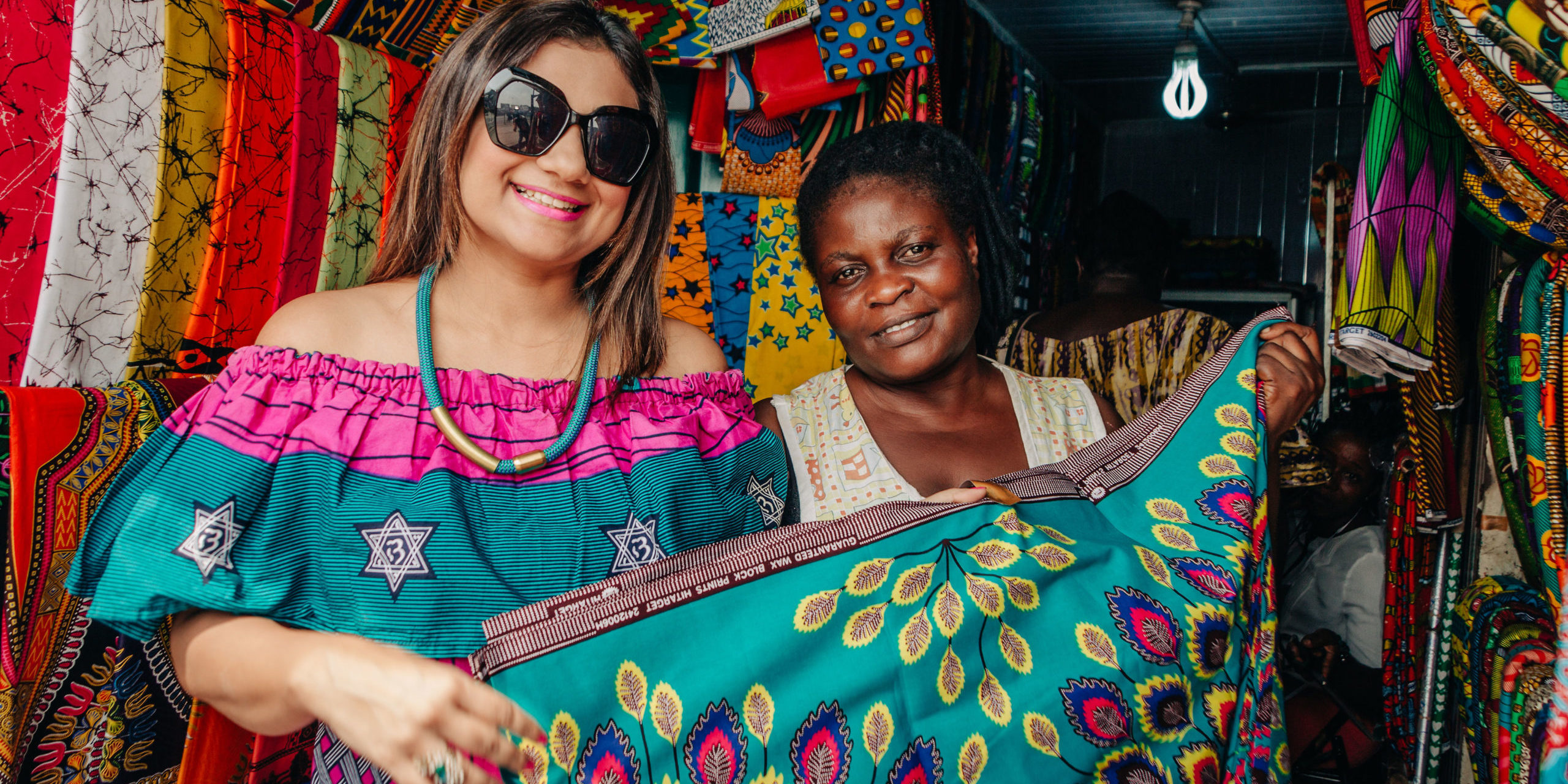FIRST IMPRESSIONS FIRST
By Mariam Ottimofiore
“What’s it like to live over there in Ghana?” asks my friend hesitatingly over Skype. Each time I hear these words, spoken by family or friends wanting to understand my new life, I take a deep breath because I don’t know where to begin.
How do I explain my current life to someone who has never left North America? Should I tell her there is no Starbucks here, and no Target? I can’t exactly jump straight into tales of heartbreaking poverty, or lack of public bathrooms, can I?
“It’s both beautiful and difficult to live here” I say after a pause.
I moved with my family of four from Dubai to Accra, Ghana in August of 2018. This is the first time we are living in this sleepy corner of West Africa. But we are not new to moving or to expat life. An expat childhood and an expat adulthood mean that Ghana is the ninth country I am living in, after the Kingdom of Bahrain, the United States, Pakistan, the United Kingdom, Germany, Denmark, Singapore and the United Arab Emirates.
So, what are my first impressions upon moving to Accra? And how prepared was I for our African adventure?
My first impressions are that Accra is safer, greener and cleaner than I had expected or imagined. Moving here from the harsh Arabian Desert, I love the shady roads lined with palm trees and Ashoka trees hundreds of years old. The greenery here is natural and not artificial or man-made. I feel safe walking the streets of our neighborhood during the day, past the coconut stand where the friendly coconut guy sells me fresh coconut for two Ghanaian Cedis (less than 1 USD). Past the roundabout where vendors walk briskly around me, carrying baskets full of waakye (a Ghanaian dish of cooked rice and beans) and an assortment of biscuits, chips, nuts and cool drinks balanced impressively in towering baskets on their heads.

The colour & chaos of Accra
Of course, processing time for our documents and receiving our container shipment took longer than expected. People had warned us to expect delays and bureaucracy, but when our container broke down and got stuck halfway between the port of Tema and Accra, everyone agreed: we had quite the start to our African adventure!
As it turns out I wasn’t as prepared for this new adventure as I thought. I was prepared for the practical hardships of this hardship posting, but I wasn’t prepared for the emotional hardships.
I wish expats living in Ghana would have talked less about which products or which brands are not available here and talked more about how most days you’re gonna feel like crying while you’re doing the school run. While I sit in my air-conditioned car, driven by my Ghanaian driver, the vibrant street life is both beautiful and yet heartbreaking because there is much poverty around me. It is poverty with a smile, because Ghanaian people are so friendly and cheerful, which is almost tougher to reconcile. Vendors walk by, selling everything from food to washing powder at traffic lights to make a living. Sometimes these include young kids. Or the blind. Or the handicapped. Some days I hide behind the tinted windows of our air-conditioned car. Other days I wind the window down, engage in banter and buy some plantain chips or locally produced delicious Ghanaian chocolate.
“But you grew up in Pakistan…you must be used to poverty?” asks my friend on Skype.
This is the thing. You NEVER get used to poverty. If you do, good for you, but I think I’m glad that I’m still not used to it. Many days I need courage to look beyond the ramshackle tiny houses on the streets, the plastic at the beaches, the dirt on the faces of street children and indulge in all the things that I absolutely love about this country.
The colorful African clothes and fabrics such as Kente which the women and men wear here which catch my eye and make my spirits soar high.
Spicy jollof-rice which suits my Pakistani palate just fine.
The rich culture and traditions of the Akan people in Accra delight me, such as how you can tell so much about a person based on which day they were born.
The assortment of different languages spoken around me – Twi, Ga, Ewe, Fante, English and French.
After picking up my kids from their international school and kindergarten, I arrive back home. To our old colonial style house. There are four bedrooms, a swimming pool and a mango tree in our backyard. A generator for when the electricity goes which is a normal occurrence. My Ghanaian housekeeper usually greets me; she has in a short amount of time become part of the family. When I ask her where to go to buy good avocadoes or fresh okra, she knows exactly the place to go. She tells me where the eggs are good, where the chicken is fresh and which vendor charges expats or “obroni’s” (foreigners or people with lighter skin) more than necessary!

Mariam in the market
Adjusting to life in Accra after Dubai has been challenging, but not in the way I was expecting it. Initially the lack of choice in shopping, entertainment and leisure activities felt limiting, but after only a few months here, it feels liberating. It is teaching me to keep our lives simple. Choice and often too much choice is not a good thing, I’m learning. Freeing ourselves of this cycle of constant consumption is probably one of the best aspects of our new life in Africa.
With it, comes the unique chance to teach our young kids (seven-year-old and four-year-old) that a childhood in Ghana means enjoying the simple pleasures in life. The wide, open spaces, playing in parks with just one slide or one tree house, reveling in the different birds that wake us up every day (from a raven to a magpie to an African version of a crow – MUCH louder!), taking excursions out of the city to enjoy the African bush, the hills, the wildlife, the nature and to see the fisherman mending their nets at the end of a long day by the beach brings a sense of peace and calm to our expat lives. Our Third Culture Kids (TCK) kids are learning to be grateful for everything they have and to help those in need, as age-appropriate conversations are initiated around what we see and experience on a daily basis.

The Ottimofiore family explore Ghana
Seven months in, I realize that the key to expat life in Ghana is not experience; it’s your attitude and perspective. Whether Ghana is your ninth country to live in or your second, you have a choice to shape your new adventure.
You can complain about the traffic you are stuck in on a Friday, or you can appreciate the beauty and the vibrant colors of the dress of the woman who walks past by your car, holding her basket full of food, high up as a crown.
You can focus on the frustration you feel at the leaky water pipe at home, the unreliable internet and handymen not showing up when they said they would or, you can focus on learning a fascinating new culture with rich traditions of Batik painting, West African drumming and chocolate making.
You can focus on the risk of malaria or you can focus on that fact that you probably belong to the 5% who can afford to pay for malaria medicines should you need it.
As an expat, first impressions are vital. They can either help you adjust to your new life or feel overwhelmed by it. Use your first impressions of a place to figure out what excites you, what bothers you, and how you would like to use your time in a new country.
_
To read more of Mariam’s Dwell guest posts, and to receive your free Living in Ghana guide, sign up for our monthly newsletter HERE.
_
About the Author: Mariam Ottimofiore is an adult TCK and a Pakistani expat, who has lived in Bahrain, US, Pakistan, UK, Germany, Denmark, Singapore, UAE and Ghana. She is an economist, writer, researcher, author and blogger at And Then We Moved To in which she explores expat life, raising multicultural and multilingual children, and world travel. Her new book This Messy Mobile Life: How a MOLA can help globally mobile families create a life by design (Summertime Publishing, 2019) is the first book in the expat genre that ties in multiculturalism, multilingualism and mobility to equip international families to navigate the complex challenges they face as global expatriates. You can follow her work on Facebook, Instagram and Twitter.







